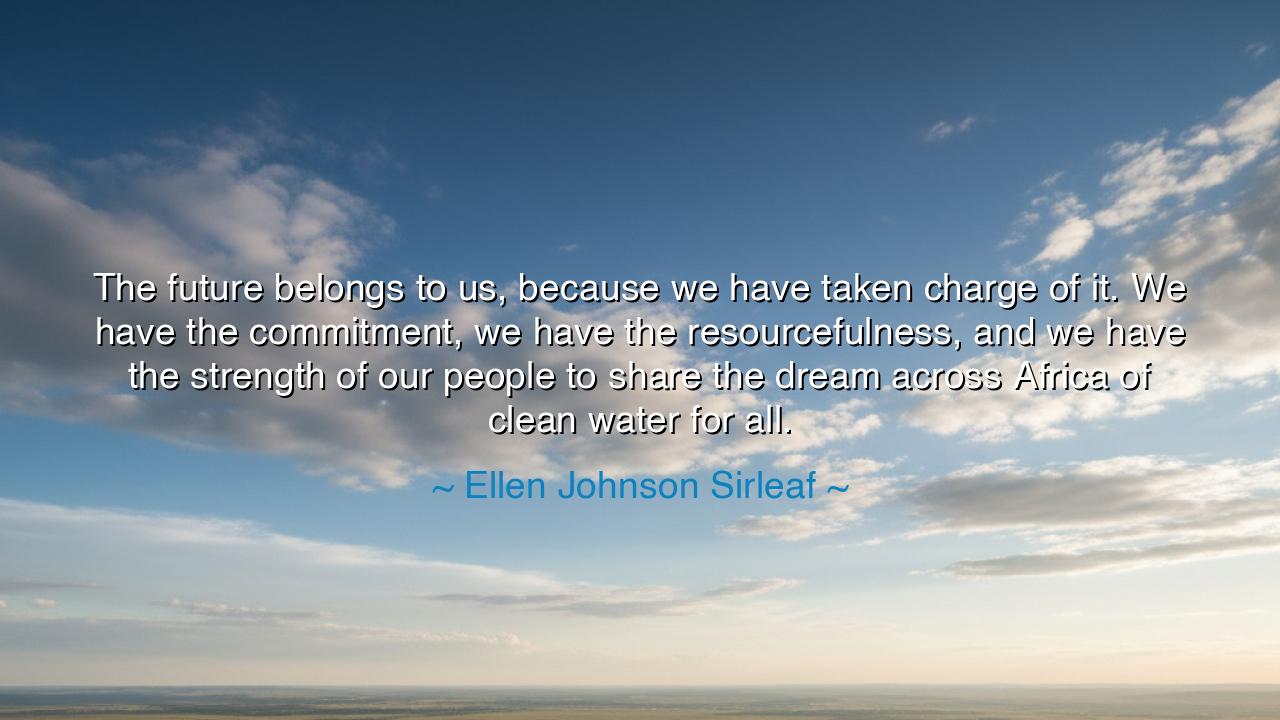
The future belongs to us, because we have taken charge of it. We
The future belongs to us, because we have taken charge of it. We have the commitment, we have the resourcefulness, and we have the strength of our people to share the dream across Africa of clean water for all.






"The future belongs to us, because we have taken charge of it. We have the commitment, we have the resourcefulness, and we have the strength of our people to share the dream across Africa of clean water for all." These powerful words by Ellen Johnson Sirleaf reflect a vision of empowerment and collective action. Sirleaf speaks not just of the future of Africa, but of the potential that lies in the hands of those who are determined, resourceful, and united in a common goal. The future is not something that will be passively awaited; it is something that is actively shaped by those who take charge, by those who possess the strength to pursue what seems impossible. In this case, the goal is the dream of clean water for all, a vision that speaks to the basic human right of access to clean resources and the collective responsibility to ensure that this right is achieved.
In the ancient world, the concept of taking charge of one's future was a core tenet of both philosophy and action. The Greeks, particularly the Stoics, understood that while one cannot control the forces of nature, fate, or time, one can always control their own response to the challenges of life. Epictetus, a Stoic philosopher, emphasized that virtue and strength of character were the keys to navigating the adversities of life. Just as the ancient heroes like Achilles or Hercules found themselves facing impossible tasks, they embraced their challenges with resolve and purpose. Sirleaf's words reflect this Stoic understanding—that the future belongs to those who are willing to take action, who choose to lead and fight for the greater good even when faced with immense obstacles.
The Romans, too, believed in the power of self-determination. In the early days of the Roman Republic, it was the common people, the plebeians, who took charge of their destiny by fighting for their rights against the patrician class. Through commitment, resourcefulness, and unwavering strength, they created a system that, though imperfect, allowed them to have a voice in the political decisions of their society. The Romans understood that no one, not even the elite, could claim the future as their own without the strength of the people behind them. Sirleaf’s words echo this ancient belief that true power comes from unity and the collective strength of a people committed to a shared vision.
Consider the example of Mahatma Gandhi, whose leadership in the Indian independence movement was driven by a deep belief that the future of India could not be shaped by external powers. Through his commitment to nonviolent resistance, his resourcefulness in using limited means to create a massive movement, and his unwavering faith in the strength of the Indian people, Gandhi helped lead India to independence. Just as Sirleaf calls for the people of Africa to unite and take charge of their own destiny, Gandhi’s story is a testament to the power of self-determination and the force of collective action in shaping the future. His fight for freedom, much like Sirleaf’s campaign for clean water, was not a lone battle, but a unified effort driven by vision and determination.
The lesson in Ellen Johnson Sirleaf’s words is that the future is not something to be feared or merely hoped for. The future belongs to those who have the vision, commitment, and strength to shape it. It is a call to arms for those who believe that the world can be changed by the collective efforts of those who are willing to put aside individual desires for the common good. Sirleaf reminds us that when we unite behind a shared goal, no obstacle is too great, no challenge insurmountable. Just as the ancient heroes undertook great feats to secure the future for their people, we, too, must take responsibility for the future we wish to see.
In practical terms, we can apply this wisdom by embracing our role in the world and recognizing the power of collective action. Whether we are working to solve a local issue or a global crisis, the principle remains the same: commitment to a shared goal, the resourcefulness to work with what we have, and the strength to persevere in the face of adversity are what will ultimately shape the future. We must ask ourselves, “What is the dream that I can share with others?” and then take action to make it a reality. Just as Sirleaf has inspired a generation to fight for clean water, we must find our own causes and lead with courage.
Finally, let us take Sirleaf’s message as a reminder to look beyond our individual concerns and think about how we can contribute to the greater good. The future does not belong to those who wait for change to happen; it belongs to those who create it. Let us be the change-makers, the visionaries, and the leaders who rise above the noise and claim the future for the generations to come. Whether in our communities, our nations, or across the globe, we can, together, take charge of our future and bring about the transformation we seek.






AAdministratorAdministrator
Welcome, honored guests. Please leave a comment, we will respond soon